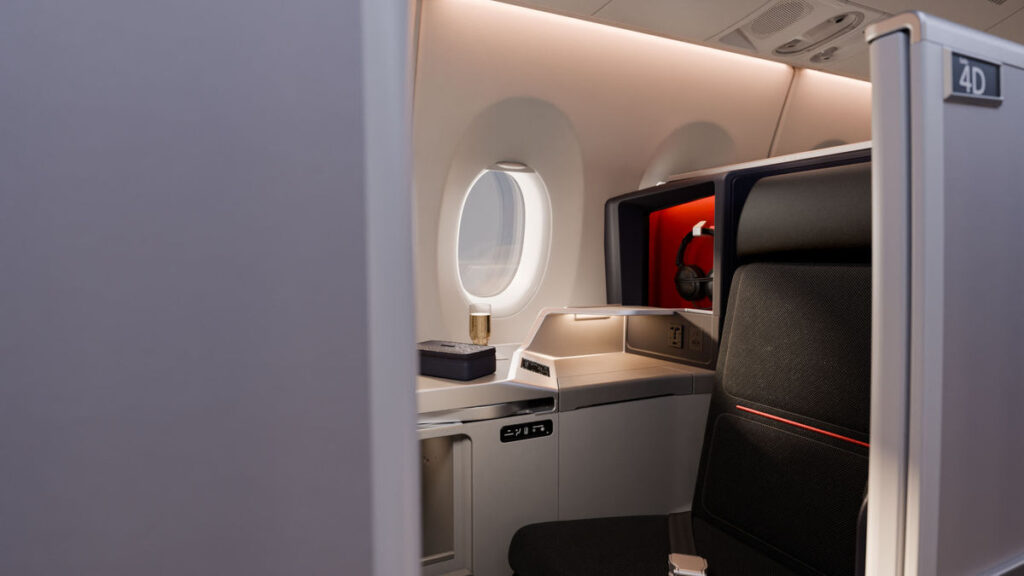
In 2026, business class is going basic.
That seems to be the plan for major U.S. carriers like Delta and United Airlines, which both have hinted at forthcoming launches of unbundled business fares—essentially a premium version of basic economy—in the near future.
Luxury carrier Emirates pioneered the a la carte premium ticket with the launch of its “Special” business class fares in 2019. Now other prominent international airlines, like Etihad, Qatar, KLM, and Finnair, also offer unbundled business tickets. With those carriers, the amount you pay for your ticket includes a seat in the business cabin and a carry-on bag, but extras like seat selection, checked luggage, priority boarding, and lounge access all come with add-on fees.
Delta first mentioned its intention to launch unbundled fares in business class in late 2024. The airline says it’s been working on the fares’ rollout in recent months. “We’re testing it with customers today, and we’re doing a lot of surveys,” Glen Hauenstein, Delta’s president, said on its second quarter earnings call in July. “And we haven’t rolled it out yet, not because we don’t have the technological capability, but we wanna make sure that customers understand what we’re putting in market and that they find value in it.” The airline hasn’t yet revealed when it plans to debut the new fares.
When asked on a recent earnings call if United was considering a similar new fare class, airline executives hinted that they might be launching the basic-style tickets in business. “Not everybody wants the full experience,” Andrew Nocella, United’s chief commercial officer, said on the airline’s July 2025 earnings call. “We look forward to continuing to diversify our revenue base and segment it in the appropriate way, and I’ll leave it at that.”
With basic business class on the horizon, most experts say the new booking concept will make premium fares more expensive in the long run.
“By making perks that were once a given to the business-class experience add-ons that come with extra costs, these fares could drive up the overall cost of travel, which is definitely a net harm to consumers,” says Sarah Silbert, managing editor at Points Path, an online plug-in that helps travelers compare the price of airfares in points and miles. “This would apply to both cash fares and award redemptions, as we already see carriers like Delta offering the cheapest award flight rates with more limited features, like no seat assignment until check-in.”
Despite their restrictions, the cheaper premium fares could give more travelers a shot at trying larger, more comfortable seats at the front of the plane at a more accessible price point.
“There’s nothing inherently bad about basic fares as long as you do your research and understand the limitations,” says Kerry Tan, professor of economics and department chair at Loyola University Maryland. “Unbundled business class could be a cost-effective, no-frills way to travel from point A to point B in style.”
Once the new fare classes launch, travelers should pay even closer attention to the conditions of the tickets they purchase and ensure services that are deal breakers for them, like free ticket changes, are included or offered for a reasonable add-on fee.
“Read the caveats and extra costs carefully before booking any basic fare, regardless of cabin, and remember that even with a basic fare, you can cancel your flight within 24 hours of booking, thanks to U.S. Department of Transportation rules,” Silbert advises.
Fliers should take extra care when comparing prices across airlines, as it won’t be immediately clear what each ticket includes. “It may also be annoying for frequent fliers to filter out the basic fare class when comparing the price of a business class ticket across different airlines or using different booking websites,” Tan says.
Be sure to include the cost of add-on services you need when pricing out airfares. If a regular business ticket is slightly more expensive but includes free changes and cancellations, it could be worth booking the upgraded fare and paying a bit more, depending on your needs.
Although many travelers will bristle at the idea of services being stripped away from luxe business fares, the reality is that air passengers will likely jump at the chance to try out a more comfortable seat at the front of the plane. So far in 2025, the demand for premium airline products has been surging, with no signs of the trend slowing down. Airlines are adding more seats to their business and premium economy cabins in kind.
“This could be an effective way for airlines to entice customers to enjoy a premium cabin with the hopes that they continue to upgrade their seat from main cabin for future flights,” Tan says. “Ultimately, airlines are presumably profit-maximizers, so this would be another way for them to extract more money from passengers.”
For the latest travel news, updates and deals, subscribe to the daily TravelPulse newsletter.

